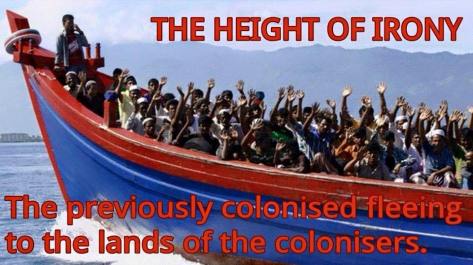Robert Osborne knows more about movies than anybody in the United States. He has been introducing movies on TCM (Turner Classic Movies) for over twenty years. His introductions to old movies are always very welcome and often fascinating.
But he doesn’t know so much about history.
When introducing a 1951 movie titled “Soldiers Three,” a bit of a comedy based on a Rudyard Kipling story, he commented on how, quite often, in Hollywood’s golden period (the thirties and forties) movies were set in India under the British Raj. He described this as “a time when there were always some Bengal Lancers ready to jump in to help out a noble cause.” He spoiled this when he added: “We now know, of course, what really happened in India under the British, that it wasn’t so noble at all . . . ”
This might not have bothered me too much, except that I had just heard something similar from a doctor at the University of Michigan Hospital. We shared a very amicable conversation about Diego Garcia, of all places.
Diego Garcia is an island in the Indian Ocean that has been turned into a major military base. The island has been a British possession for two centuries, having been acquired from France following Napoleon’s defeat in the Napoleonic Wars. According to the doctor, there are only 55 Brits on the island today, while there are over 2,000 Americans. The Brits have the unenviable task of policing the island, where the only trouble the Americans can get up to involves alcohol! There really is nothing else to do. Even swimming is out as the island lies in shark-infested waters.
Towards the end of the conversation, my doctor made a derogatory remark about the colonial period in Africa and how much better off the Africans are now.
I instinctively came to the defense of the colonial period pointing out that this was not the experience my wife and I had – that Ghana and Zimbabwe, the two countries we lived in, were much better off under British colonial rule than they have been since independence.
Which brings me back to Robert Osborne’s comment. “We now know, of course, what really happened in India under the British, that it wasn’t so noble after all . . . ’’
This is a loaded statement and very misleading, to put it mildly.
There is nothing we know now about colonial India that we did not know under the Raj. The same can be said about Africa.
What has changed is the attitude toward empire.
The movies Mr. Osborne was referring to, made prior to “Soldiers Three,” a movie frankly not worth watching, were movies like “The Lives of a Bengal Lancer” made in 1935. They were all pro-British and showed what the British were doing in India, notably policing the North-West Frontier, where hostile tribes were always causing trouble. This area was arguably the most violent part of the empire during the two centuries of British rule. Today, it is a stronghold of the Taliban, al-Qaeda and now, of ISIS. Neither the Pakistani nor the Afghan government has a handle on the situation there. Looking back, it would have been better to keep it under British control, thereby avoiding 9-11. Twelve years after independence, the movie “North-West Frontier” (1959) showed the British role in the region in a positive light.
But in the following decades, attitudes changed toward the empire, just as they changed in the United States toward its own history. Instead of being proud of past accomplishments, in the 1960’s history was taught with a sense of shame. This self-loathing on both sides of the Atlantic has led to what African-American writer Shelby Steele calls “White Guilt,” the title of his 2006 book. Whites now feel guilty about everything in their collective past and constantly fork out billions to try to “put things right.” Those billions have achieved nothing. Given to Africa and India, the money is siphoned off by the wealthiest people with little benefit to the poor, while in the US, they have produced an underclass perpetually dependent on welfare.
This change in attitude was partly the fault of Hollywood, which started making movies that made Britain and America look bad.
But it can be largely blamed on academia. Liberal socialist (even communist) intellectuals got control of western universities and started filling the minds of young people with anti-western propaganda.
When asked what Britain had ever done for India, Indian writer Dinesh D’Souza responded with the following words:
‘Apart from roads, railways, ports, schools, a parliamentary system of government, rights, separation of powers, checks and balances, the rule of law, and the English language . . . nothing!’”
The same gifts were bestowed upon the British colonies in Africa and the Caribbean. Sadly, since independence, many of these countries have endured dictatorships and debilitating poverty as the dictator keeps all the wealth for himself.
This is why people are fleeing their home countries in the millions, seeking a better life, ironically in the countries that used to rule them. What a pity the Bengal Lancers aren’t around today to take on the noble cause of ridding the world of some of these evil despots!

